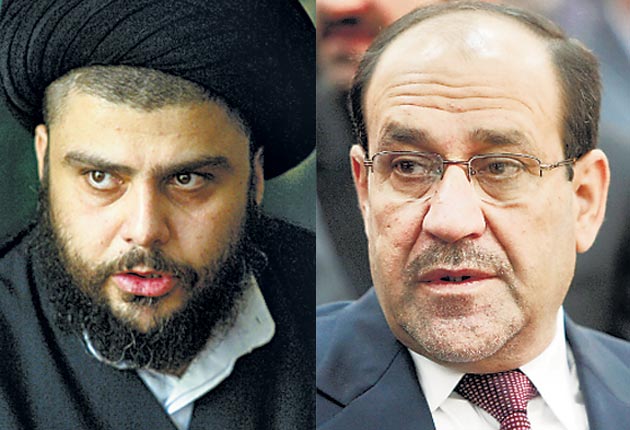Parties unite to back Maliki for new term as Iraqi PM

The Shia political parties have finally united to agree on the serving Prime Minister Nouri al-Maliki as their nominee to remain in the job, breaking a seven month-long deadlock that has prevented a new government being formed.
The end to the stalemate came with the surprise decision by the nationalist Shia cleric Moqtada al-Sadr and his followers to abandon their resistance to Mr Maliki staying in his job.
The way is now open to the formation of a new government which, like the old, will be dominated by the parties representing the Shia and Kurdish communities. The reuniting of the Shia bloc is seen as a political triumph for Iran which has long agitated for the Shia parties to come together again. The Sadrists openly admit that they took their decision under heavy pressure from Iran. Syria, which has been even more distrustful of Mr Maliki, also appears to have softened its opposition to him under Iranian pressure.
The US had wanted to keep Mr Maliki in power but, in tandem with Iyad al-Allawi, the leader of al-Iraqiya, as his partner. Al-Iraqiya came first in the 7 March election with 91 seats in the 325-member parliament, just ahead of Mr Maliki's State of Law coalition with 89 seats. The election produced two surprises which led to a political impasse. Mr Allawi did unexpectedly well because, although he is a secular Shia, his votes came mainly from the Sunni who voted as a bloc. Mr Malki had calculated that State of Law would come out well ahead of the Iraqi National Alliance (INA) that contained the Sadrists, the Islamic Supreme Council of Iraq (ISCI) and al-Fadhila, a smaller Shia party. But when the votes were counted, the INA had got 70 seats of which the Sadrists held 39.
The agreement has been pushed through by Mr Sadr despite the deep antipathy of many of the Sadrist rank-and-file against Mr Maliki. In 2007-8 he routed their Mehdi Army militia and imposed central authority with US help. The new government, dominated by the Shia bloc, is likely to insist that all American troops leave Iraq by the end of 2011 as they are pledged to do under an agreement signed during President George W Bush's last days in power in 2008.
The Sadrists and the Kurds will both be suspicious that Mr Maliki will try to claw back the executive authority that he has promised to cede as the price of holding his job. The agreement leaves Iraqiya out in the cold for the moment and Mr Maliki will try to co-opt parts of Mr Allawi's following to prevent the Sunni feeling wholly marginalised. The struggle for political power in Iraq is so intense because control of the state means control of oil revenues and well-paid jobs in a country of high unemployment. All the political parties have elaborate patronage machines.
Join our commenting forum
Join thought-provoking conversations, follow other Independent readers and see their replies
Comments